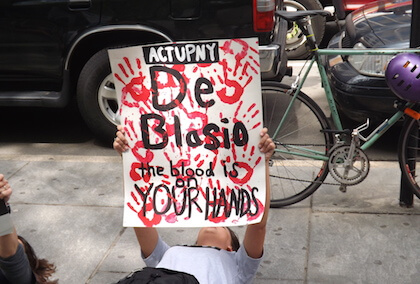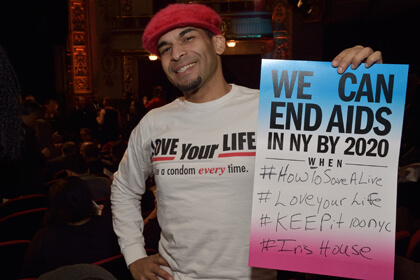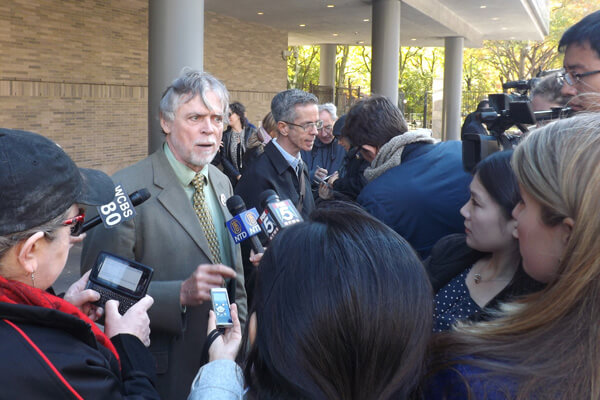BY PAUL SCHINDLER | Gay Men’s Health Crisis had a very good day the Sunday before last when its annual AIDSWalk fundraiser in Central Park exceed expectations, raising at least $5.7 million, with the final tally still not in.
But good days have been few and far between for the world’s oldest AIDS organization. Facing an end-date of December 31 on its West 24th Street lease and an exorbitant rent increase if it chooses to stay there, the agency plans to move, in significantly downsized form, to a new facility on West 33rd Street, nine blocks north and, more significantly, three long avenues west of its current site.
Relocating an agency the size of GMHC would surely be taxing in and of itself for a non-profit already struggling in an environment where the public and fiscally beleaguered government funders have too often lost their sense of urgency about the epidemic.
Facing huge rent hike, agency’s choice of new locale spurs outrage
But GMHC faces a more profound and immediate challenge — responding to a storm of shock, criticism, and even rage about the plans it has made and the manner in which it has communicated them. The agency’s foes range across a wide spectrum of interested parties. Chief among the critics are its Client Advisory Board (CAB); longtime activist Larry Kramer, who was among the co-founders of GMHC in 1982; and three leading institutional leaders in New York’s AIDS community — Dr. Roy M. Gulick, chief of the Division of Infectious Diseases at Weill Cornell Medical College, Tom Viola, executive director of Broadway Cares/ Equity Fights AIDS, and Regina Quattrochi, executive director of Bailey House, an AIDS housing services agency.
Dr. Lawrence D. Mass, with Kramer, one of the agency’s six co-founders, struggled to be constructive in his response, writing in an email to Gay City News, “A compromised and diminished GMHC is better than no GMHC.”
How did a lease renewal challenge turn into such a mess?
According to Dr. Marjorie Hill, the chief executive officer at GMHC, the agency has been focused on its leasing problems dating back more than two years. With a year-end 2010 lease expiration, it recognized that its current rental cost — which includes base rent, real estate taxes, and required facility upgrades — would rise, beginning in 2011, from about $6 million to $8 million. On top of that, the agency saw at least $2 million in additional necessary upgrades beyond the normal annual hit — for a new roof, repointing of the building, and a heating and air-conditioning overhaul.
Clearly, in Hill’s view, new space was needed; she told Gay City News that in two years’ time, the agency has looked at more than 40 potential sites. The challenges were formidable, she explained. Many landlords are “not eager” to have social service tenants. There is a “real pushback” against medical services, which involve the handling of medical waste, by Manhattan’s real estate market. Prospective landlords told her that leasing to an agency with a medical clinic that also does drug trials and with an HIV testing facility was “not a good fit.”
Hill acknowledged that she and her team got “the feeling” that landlords were uncomfortable with a client base that was LGBT, often poor, and living with AIDS or HIV. She said one prospective lessor, upon hearing about GMHC’s much-vaunted hot lunch program, said he does not rent to “soup kitchens.”
In settling on the space on West 33rd Street, two floors in the Associated Press building just east of Tenth Avenue, Hill made what she characterized as a series of tough but necessary decisions. The medical clinic, which New York Presbyterian-Weill Cornell Medical Center has run as an AIDS patient care and clinical trial unit as a sub-lessee of and in cooperation with GMHC since 1997, would not be part of the new facility. She said that the agency’s records indicate that only 200 of its 10,000 clients get their care there, a point disputed by Gulick. The medical clinic is not “core” to GMHC’s mission, Hill said; losing it was “not a deterrent” to choosing a new site.
Similarly, the Geffen Center, out of which HIV testing and needle exchange programs are run, will not move with the agency, though Hill pledged to locate a satellite facility elsewhere in Chelsea to house that effort.
The change that has perhaps triggered the most alarm among clients, however, is the decision to dispense with GMHC’s hot meals program — at least in its current form. Given the enormous cost of outfitting the space at the AP building for a full industrial kitchen, the agency announced that it would instead look at convection ovens to produce a menu of gourmet sandwiches, stews, and chili. In a May 13 interview with Gay City News, Hill made clear that a lunch program is core and that even in its new form, the offerings would meet all federal health nutrition guidelines.
Still, when discussing the new approach, Hill’s explanation suggested a tone-deafness toward the critical significance the current hot meals program has in the lives of many GMHC clients. “We’ve had the same menu for 20 years,” she said. “It’s time to try something new.” Critics have been unwilling to buy the lemonade Hill is trying to make from what they clearly view as a lemon.
As news of the agency’s plans circulated publicly in the late winter and early spring, an outcry erupted. Kramer, though placated for a few days by a lunch meeting he had with Hill, has for the most part been a strident critic of the plan; in a widely circulated May 7 email, he charged that “the board of GMHC is suddenly in bunker mentality and determined to sign the lease on a disastrously inappropriate new space.” The following week, he told Gay City News that he became active on the issue in response to desperate appeals from client leaders at the CAB.
“They come to Daddy,” he said. “They know Daddy has a loud mouth.”
In a wide array of settings — including a raucous May 13 CAB meeting in which clients angrily confronted Hill and a board leader; in a smaller, more sedate protest outside GMHC’s current building the following week; and in a May 20 dialogue with the agency’s full board — the CAB has articulated a series of “deal breakers” it said must be rectified in the current plan.
The lack of hot meals, an HIV testing facility, and a medical center were all identified. Clients are also angry that the agency proposed replacing the popular Friday evening dinner with a vaguely described plan for “special events” that night. There is also a furor over plans for GMHC to establish its own entrance to the AP building through one of the current loading docks. Hill explained that the agency wants to “brand” its entrance, and also noted the approach would expedite clients’ access by eliminating their need to go through security in the building’s main lobby.
But Joseph Sellman, a client leader who, like Hill, is African-American, said the proposal reminded him of his experiences with Jim Crow practices growing up in the 1950s. Marcelo Maia, another CAB leader, said of the building’s owner, “They don’t want us walking through the lobby. They don’t want a group of black, Latino, poor, and sick people walking through the lobby with all the professionals there.”
Bailey House’s Quattrochi is unsympathetic to the resistance by landlords to integrating an AIDS agency, with medical services, into a commercial building. Citing her own persistence in locating her agency in a new home in East Harlem, she warned that GMHC’s capitulation to the obstinacy of landlords and its decision to build a separate entrance to its new building “will set us all back 20 years and deepen stigma.”
Viola is also alarmed by what he sees of GMHC’s plans. He told Gay City News that Broadway Cares would likely curtail its customary $25,000 annual contribution to the agency.
Clients have voiced unhappiness as well with the siting of the new headquarters, nearly two full avenues west of Penn Station, the closest subway hub, and directly opposite a truck entrance to the Lincoln Tunnel. That area of Manhattan is slated to undergo massive redevelopment in the next several years as construction in the Hudson Yards area gets off the ground.
“I keep having images of sick people standing in the snow and rain on a freezing winter day waiting for that crosstown bus,” Kramer wrote in his May 7 email. Maia complained that the Lincoln Tunnel traffic exhaust and the dirty air created by massive construction projects will pose health risks for people already living with compromised immune systems.
The inconvenience of the location coupled with the slimmer offering of services, especially the meals program, Maia predicted, will mean that many GMHC clients will vote with their feet. “Momentum [Project] and Harlem United are more convenient,” he said.
Weill Cornell’s Gulick is also concerned about the curtailing of critical services at GMHC. He said the clinic he founded in cooperation with the agency 13 years ago now serves more than 1,000 clients on a regular basis. Half of them, he said, are also clients of GMHC, an estimate roughly three times the one Hill gave. He said that during the clinic’s life, significant clinical trials have been carried out there, including some of the first and most important of the triple combination cocktail tests of the late 1990s.
Gulick also emphasized the one-stop shopping value of the Weill Cornell clinic’s co-location with GMHC. Nutritionists who work for GMHC, for example, are housed in the medical clinic, and the clinic targets those who test positive at the Geffen Center for immediate medical intake.
Gulick is clearly angry about what he sees as cavalier mistreatment by GMHC.
“We have been left out of all discussions,” he told Gay City News. “We were informed they are moving to a building where no clinical care is possible. It was the final word. We felt our contribution was undervalued.”
Hill and her board are scrambling to respond to the avalanche of criticism, even as the agency works to nail down its new real estate deal. GMHC’s initial thought of moving the testing center to Brooklyn was scrapped in favor of establishing the Chelsea satellite, though Hill had no progress to report on finding a locale. She promised the CAB that a nutrition consultant would be brought in to make the most of the cooking infrastructure the new building will have. The agency is also revisiting the issue of cutting the regular Friday dinner. Hill emphasized that vans will be available for clients needing to commute across town to Penn Station or to other transit hubs.
Those efforts — along with her decision to give the CAB leaders a chance to meet with the whole board on May 20 — have yielded some good will among her critics, but to a very limited degree. One recurrent theme among detractors has been the suspicion that GMHC is no longer an agency run by people living with AIDS, and Maia said that he sensed during last week’s board meeting a greater appreciation among some members, whose HIV status he is unaware of, about what it means to live daily with the virus.
Still, Maia and other CAB leaders and members remain disillusioned, upset, and pessimistic about the future of the agency. A protest planned for this week outside the proposed new site was canceled; Maia explained that he and his fellow client critics are unwilling to engage in civil disobedience. “We don’t have the money to be paying for lawyers,” he explained.
Kramer believes that the growing resignation among clients resulted from agency intimidation. Management and the board, he wrote, “have succeeded in so terrifying the CAB board and clients that they are frightened to appear in public.” Kramer said that one former CAB leader had been barred from GMHC’s building for a year as the result of his activism.
As Gay City News went to press, Maia and other client leaders planned to take a tour of the new facility led by agency staff on May 27, a sign that they continue to harbor some hope of making things work on West 33rd Street.
But while he welcomed a meeting planned for June 2 in City Council Speaker Christine Quinn’s office, at which Hill, other agency leaders, and CAB members will be present, Maia added, “I don’t know if she can really mediate anything. If they want to move, they will move.” Assistance from Quinn and other elected officials, he said, might best be applied to locating a site for the satellite testing and prevention center.
As GMHC’s lease negotiations neared completion, Kramer stuck to a militant posture, waging what he termed a “phone zap” effort aimed at Broadway Partners, the building’s owner who must approve the sublease widely believed to have already been signed with WNET, one of the AP building’s tenants. (Hill would not comment on the status of lease negotiations.) Kramer has circulated emails showing that the landlord is skittish in the face of the opposition being mounted. GMHC has, in turn, contacted State Senator Thomas K. Duane, forwarding what one board member termed “a threatening message that Larry Kramer left for the landlord at 450 West 33rd Street.” Duane’s office responded that the matter should be addressed to the police department.
How and whether this drama will find any satisfactory conclusion remains unclear. Kramer is hopeful of keeping up the pressure, but said he cannot do so unless the CAB is willing to engage in further demonstrations, possibly involving getting arrested, something client leaders seem to have ruled out.
As recently as May 25, the fiery old activist remained proud and resolute in his resistance. “Is Larry Going to Get Arrested?,” read the header of an email that day from Kramer. “Larry Hopes So.”
Now, he is waiting for the next opportunity to brainstorm with his client allies.
“This entire situation,” he explained on May 27, “is ineffably sad.”

































